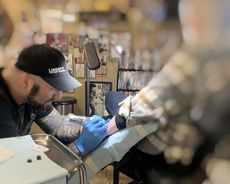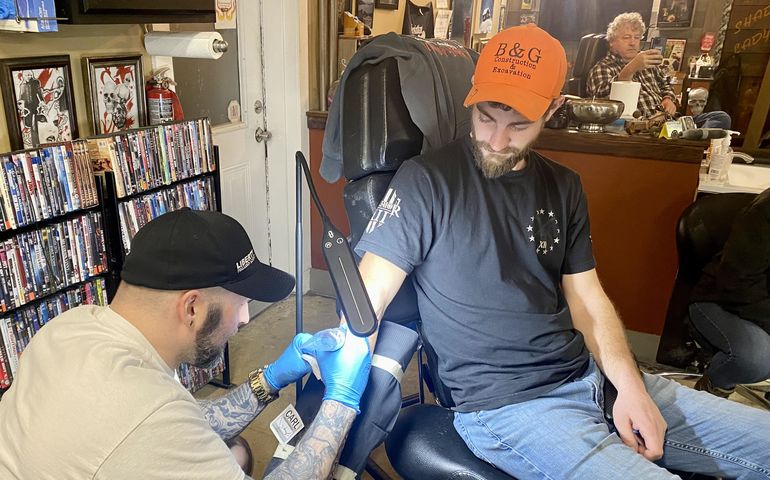
Processing Your Payment
Please do not leave this page until complete. This can take a few moments.
- News
-
Editions
-
- Lists
-
Viewpoints
-
Our Events
-
Event Info
- Women's Leadership Forum 2025
- On the Road with Mainebiz in Bethel
- Health Care Forum 2025
- On The Road with Mainebiz in Greenville
- On The Road with Mainebiz in Waterville
- Small Business Forum 2025
- Outstanding Women in Business Reception 2025
- On The Road with Mainebiz in Bath
- 60 Ideas in 60 Minutes Portland 2025
- 40 Under 40 Awards Reception 2025
- On The Road with Mainebiz in Lewiston / Auburn
- 60 Ideas in 60 Minutes Bangor 2025
Award Honorees
- 2025 Business Leaders of the Year
- 2024 Women to Watch Honorees
- 2024 Business Leaders of the Year
- 2023 NextUp: 40 Under 40 Honorees
- 2023 Women to Watch Honorees
- 2023 Business Leaders of the Year
- 2022 NextUp: 40 Under 40 Honorees
- 2022 Women to Watch Honorees
- 2022 Business Leaders of the Year
-
-
Calendar
-
Biz Marketplace
- News
- Editions
- Lists
- Viewpoints
-
Our Events
Event Info
- View all Events
- Women's Leadership Forum 2025
- On the Road with Mainebiz in Bethel
- Health Care Forum 2025
- On The Road with Mainebiz in Greenville
- On The Road with Mainebiz in Waterville
- + More
Award Honorees
- 2025 Business Leaders of the Year
- 2024 Women to Watch Honorees
- 2024 Business Leaders of the Year
- 2023 NextUp: 40 Under 40 Honorees
- 2023 Women to Watch Honorees
- 2023 Business Leaders of the Year
- + More
- 2022 NextUp: 40 Under 40 Honorees
- 2022 Women to Watch Honorees
- 2022 Business Leaders of the Year
- Nomination Forms
- Calendar
- Biz Marketplace
Inking the deal: Tattoo artists say business is booming
 Alexis Wells
Douglas Wood at Leviathan Body Art in Scarborough says he never intended to become a tattoo artist but loves going to a job that doesn't feel like work.
Alexis Wells
Douglas Wood at Leviathan Body Art in Scarborough says he never intended to become a tattoo artist but loves going to a job that doesn't feel like work.
More Information
Over the last several months, small businesses have seen a potential recession looming and are afraid they might not be able to keep up with the high demand for products.
Despite those concerns, there is one industry that's busier than ever. Appointments are booking up fast, and the customer base continues to grow.
The popularity and demand for tattoos have blossomed as body ink has become more acceptable and the economy isn't even making a dent. According to IBISWorld, which researches thousands of industries worldwide, the tattoo industry in the U.S. grew 8.1% a year on average between 2018 and 2023. The market size of the tattoo is expected to increase by 7.6% in 2023. Adults between the ages of 20 and 64 have driven the demand for tattoos.

"I have never been busier in my life," said Douglas Wood as he tattooed a customer's forearm on Jan. 27 at Leviathan Body Art at 582 Route 1 in Scarborough. Wood, who's been a tattoo artist for 19 years and has worked in southern Maine for the last seven, said he's seen definite spikes in business over the past couple of years.
Although the shop shut down for more than three and half months at the onset of the pandemic in 2020, the owner of Leviathan reopened when business backed up because "everyone wanted to get tattoos at that point," said Wood, who works at Leviathan.
The shop could only allow clients and no guests on the premises during the pandemic, and clients had to be masked. But the tattoo industry was more prepared than most to implement COVID-19 health protocols, Wood said, because it already had many safety protocols in place such as sterilizing instruments. Tattoo parlors are also accustomed to using gloves and disinfectants. Pandemic rules didn't change daily operations much.
Before the pandemic, Wood booked appointments three to four months in advance. Now he's booked seven months ahead. He doesn't take deposits and has had the fewest cancellations he's ever seen.
He has yet to hear from any of his clients that the increase in prices of groceries, gas and oil has decreased their tattoo budget. Most of the cancellations are from people who may be getting sick, but their spots are always filled immediately.
Wood isn't alone in seeing a surge in demand since shops reopened and concerns over contracting the virus waned after keeping many from getting inked. Once the virus restrictions were lifted, it resulted in a rush of customers.
"Business is booming; come and get tattoos but be patient," Wood said.

Steve Marzza, owner of Dark Harbor Tattoo in Portland's Old Port, started his business in 2018. The company has hired guest artists from Florida, New York and Chicago, where business is slow.
"We have not seen a downward spiral of customers," said Marzza. "Things seem to be normal with us."
Marzza also said if there's a cancellation it's easily filled, and Dark Harbor has seen a normal number of cancellations.
"I think the economy doesn't affect tattoos too much," Marzza said. "When I have done my research in times of struggle, such as pandemics, recessions and the like, our business tends to pick up a little bit.
"What we are seeing now is a giant influx in tattoo shops since COVID. So what will happen is that the weak shops that do not market properly or run their business correctly are fully under the radar or shut down. But it's because there was an influx in shops opening. People find out quickly they don't know how to run a business."
Frank Ervin, owner of Blacklist Tattoo, at 2 Main St. in Biddeford, said when his shop, like the others, closed in 2020, "fortunately, there was a social safety net for us and everyone else.
"However, it's a shame that big business interests have swallowed up most of the [pandemic relief] funds allocated to help regular people. In fact, immediately after the pandemic closure, for me, it was the busiest I've been. The bulk of my clients are regular, working people, and the added help from the stimulus funding let them have some money in their pocket."
If a recession becomes a reality, the surge in business could end, Wood acknowledged, and getting new ink could be the least of his customers' concerns.
But right now, the artist said he will continue to enjoy the increase in demand while it lasts.










0 Comments